The other side of a miracle: Looking back at historic Iron Bowl a year later

You get 29,000 mornings, if your life is the average length, and some of those mornings follow sleepless nights, and sometimes your head feels like broken glass, and sometimes you rise in a stumbling frenzy because every minute you spend getting ready is one more minute you’re late for work.
But once in a while you have another kind of morning: charged with anticipation, alive with possibility, and you get out of bed thinking maybe today will be incredible. In Alabama they get this feeling on Iron Bowl Day, two days after Thanksgiving. This state has more college football fans per capita than any other state, and these fans wait all year for the day the Auburn Tigers play the Alabama Crimson Tide.
“If your team wins,” says David Housel, former Auburn athletic director, “you’re a better person on Monday than you were on Friday. You’re certainly better than the person whose team lost.
“That’s how people feel, and that’s why it’s so big, and sometimes so poisonous.”
On Nov. 30, 2013, Alabama is No. 1 in the country. Auburn is No. 4. The two teams have never been this good on the day of the game, which means very few mornings in Alabama history have been so charged with anticipation.
The first rays of the sun cross the Chattahoochee River at 6:20 a.m., in a forest at the southeastern corner of Alabama. Then a clear, cold morning moves west and north across the state. It reaches Dothan at 6:22, Auburn at 6:25. When the sun rises at 6:28 in Montgomery, Crimson Tide placekicker Cade Foster is asleep in the hotel where his team is sequestered. Last night he turned in at a reasonable hour and lay in the dark, thinking about field goals. Eyes locked on the target. Three steps back, exhale. Two steps over, exhale. Nod to the holder and go. No reason to worry. This season he’s missed only once: 11 games, 11 wins, 11 through the uprights.
The sun rises over Mobile Bay. A minute later it rises in Birmingham, where two women sleep in a house with a red velvet cake in the kitchen cupboard. Neketa Shepherd baked it for her sister, Michelle, and Michelle has hidden it in the cupboard so she can eat the whole thing in her own sweet time.
At 6:35 the sun rises in Tuscaloosa, lighting the Alabama Museum of Natural History, where an eight-pound black rock sits in a glass case next to a damaged wooden radio. Exactly 59 years ago, on Nov. 30, 1954, this rock fell from outer space and smashed through the roof of a house in Sylacauga and bounced off the radio and bruised a woman who was napping on her living-room couch, thus making Ann Elizabeth Hodges the only person in modern history to have been struck by a meteorite.
Elsewhere in Tuscaloosa, at Cade Foster’s one-bedroom apartment, his father puts on the coffee while his mother sleeps on the pullout couch. They drove here from Texas to spend Thanksgiving with Cade before the game. His mother brought the good china and the roasting pans, which are now washed and packed away for the trip back home. Above the television is a papier-mâché elephant head, a gift to Cade from his mother, and a poster on the wall shows him kicking off in the national championship victory over LSU. Cade’s rifle is in the bedroom, under the bed, where he keeps it for self-defense.
The sun rises in Northport, across the Black Warrior River, where Anthony Pruitt has been working since 4 a.m. Pruitt leads the grocery team at Publix #1075, whose front doors will slide open in 25 minutes. The biggest day of the year in Alabama depends on televised football, which requires charred meat and cold beer, which means this place will be a madhouse. Pruitt hustles up and down the aisles, checking the ice and red Solo cups. Red always outsells blue here in Crimson Tide country.
At 6:37 the sun rises in Carrollton, near the Mississippi line, where the outline of a man’s face is visible in the attic window of the old courthouse at the center of town. The face has appeared there since 1878, ever since the night a mob gathered on the lawn and told the sheriff to hand over Henry Wells. He’d been a fugitive for two years, suspected of burglary and arson, shot twice in the leg during his apprehension, and the vigilantes wanted him dead. The sheriff hid Wells in the attic. The vigilantes stood firm. Wells could see them through the window. Then a bolt of lightning hit a tree near the courthouse and sent a ball of fire toward the attic window. The fire tempered the glass, leaving it intact but imprinting it with the rough portrait of a terrified man. The mob dispersed. Henry Wells lived to see another morning.
One man’s disaster can be another man’s miracle. Today the state will see many of both. Ninety people will be born. One hundred and fifty will die. Some large portion of the other 4.8 million will go to bed thinking about the final second on the scoreboard clock.
*****
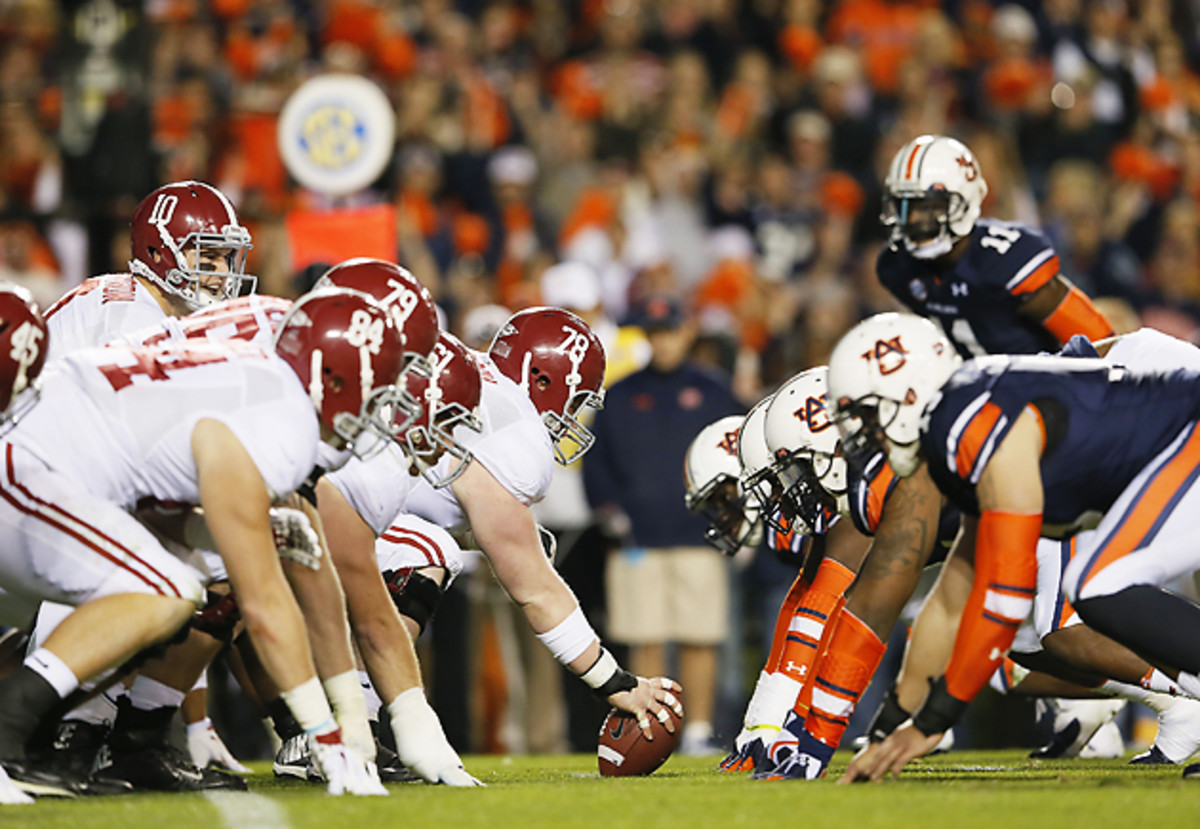
“In a few hours,” Will Herring says, “Saban and them ‘Bama boys will be rollin’ onto the plains. They don’t wanna beat us. They wanna embarrass us. Right here on our home field. In front of our families, in front of the entire country, who will be watching.”
Mid-morning at the Renaissance Hotel in Montgomery. The Auburn defensive players have gathered to watch a video pep talk from Herring, a former Auburn linebacker who plays for the New Orleans Saints. Herring has a square jaw, big neck, brown stubble, dark glasses, backwards camouflage hat. He gathers forces as he goes, like a boulder rolling downhill.
“Sure, they may have more four, five-star athletes than us. They probably got more future NFL talent than us. But lemme tell you what they don't have. They don’t have our heart. They don’t have our passion.”
• STAPLES: Rivalry week will shape College Football Playoff picture
Auburn has lost the last two Iron Bowls by a combined score of 91-14. But this season they’ve won time and again when no one else thought they would. Two weeks ago they beat Georgia 43-38 after scoring a 73-yard touchdown on fourth-and-18.
“Now I don’t care if you’re from some inner city near Miami. From some farm town way out in Arkansas. Or from right here on the red clay. You chose Auburn. And that makes us family. Family’s willing to fight for each other. Family’s willing to die for each other. Now nobody’s giving us a chance. But I’m here to say that today, Nov. 30, 2013, the mighty Crimson Tide will fall in Jordan-Hare Stadium. Let’s go, AU. Owww!!! ”
The speech takes one minute. The players will later say it gave them chills. Outside the temperature rises: 40, 45, 50. The tide rises in Mobile Bay. Both teams get on their buses and head for Auburn's stadium.
At 11:41 a.m., the sun reaches its peak in the sky over Carrollton. Across the street from the old courthouse sits a viewfinder that for a quarter will provide a closer look at the image of Henry Wells in the attic window. But the indelible portrait did him no good. A few days after the lightning struck, Wells died from his wounds in the courthouse basement. The sheriff understood the nature of crowds, the desire for spectacle, the things the vigilantes might do if they found the body. That’s why the most famous man in Carrollton is buried in an unmarked grave.
*****
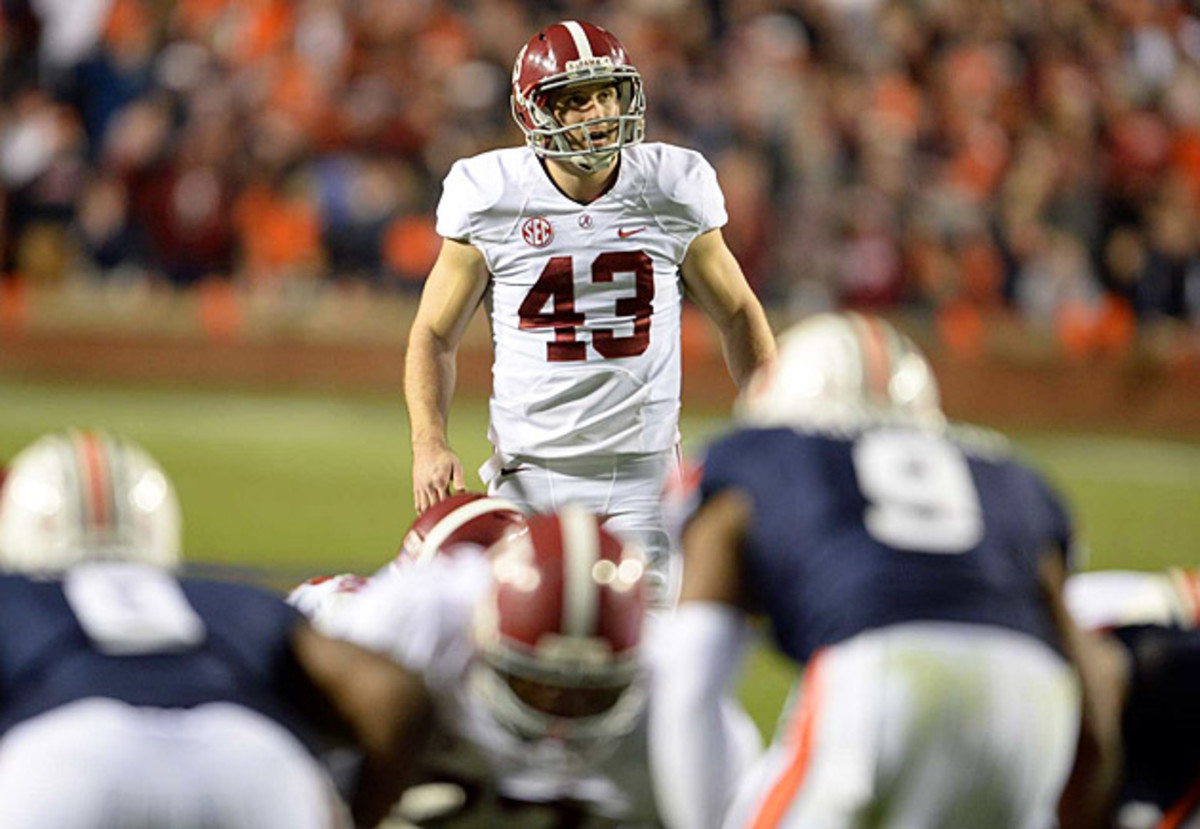
Cade Foster takes the field at Jordan-Hare, still resembling the middle linebacker he played at Southlake Carroll High. He’s 6' 1" and 225 pounds, and he bench-presses more than 400. As a freshman he had nine tackles in 13 games. During his sophomore year he chased down Florida return man Jeff Demps, a world-class sprinter. But now he can feel his right leg getting tired. Tendinitis in his left leg makes it hurt to plant his foot. In a normal pregame routine, he takes 11 kicks and makes them all. Today he misses three or four.
His parents watch from high in the bleachers, looking past the barrier of rotunda holly that runs parallel to both sidelines. These are serious thornbushes, nine or ten feet across, installed to prevent a recurrence of what happened here in 1986. Auburn might have gone to the Sugar Bowl that season if Georgia hadn’t rolled onto the plains and pulled a 20-16 upset. Then the Georgia fans rushed the Auburn field, desecrating the Auburn logo, disrespecting the police, behaving so badly for such a long time that the groundskeepers finally blasted them with high-powered water hoses. University officials were horrified. In came the thornbushes, which have generally worked. It’s been 12 years since fans rushed the field at Jordan-Hare.
Early afternoon in Birmingham. Michelle Shepherd drops the children off with their father and returns home to get ready for her friend’s Iron Bowl party. She and her younger sister, Neketa, wear matching crimson T-shirts that say BUILT by BAMA.
The sisters like football, but they love basketball. Neketa made first team all-state for Demopolis High back in ’99, and Michelle was there for every game. They take vacations in Florida to watch the Miami Heat. Neketa would rather watch today’s game at home in peace, away from the raucous and divided crowd of the party in Hoover, but Michelle wants to go. Neketa gives in. Just before they leave, Michelle takes out her personal red velvet cake and cuts another piece.
In Northport, Anthony Pruitt finishes his shift at Publix and drives home with chicken tenders for his two little girls and Bud Light for a friend named Bubba. Pruitt has a good feeling about today’s game. The Tide will roll by three touchdowns.
The temperature rises in Sylacauga, a small town in central Alabama whose quarries yield some of the finest marble in the world. Fifty-nine years ago, on a warm afternoon like this one, a meteorite fell from the clear blue sky. It pierced a roof and glanced off a radio and hit a sleeping woman through two quilts and landed on the floor, a black rock about the size of a small loaf of bread. The woman opened her eyes and said, “I think the chimney’s falling down.” Her mother called the fire department. People all around town had seen the explosion in the sky, and now they converged on the home of Ann Elizabeth Hodges to see the falling star and the woman it had touched. An eyewitness named Billy Field would later say the cars were lined up like it was the Alabama-Auburn football game.
The woman’s husband got home from work and saw a parade of strangers outside his house. As Eugene Hodges pressed through the crowd, someone said, “Hey buddy. Go back and wait in line like everybody else.”
*****
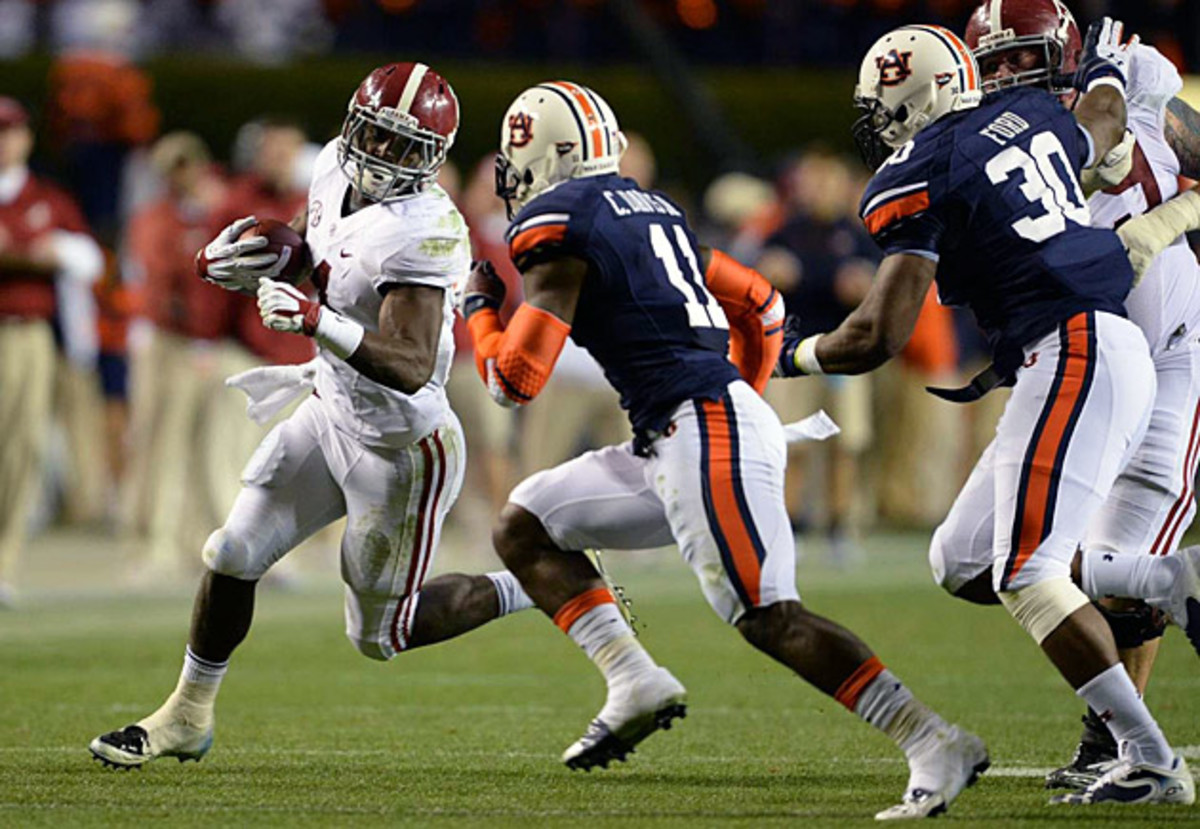
Kickoff, 2:41 p.m. On the first play from scrimmage, Alabama running back T.J. Yeldon goes for 31 yards into Auburn territory. Cade Foster watches and prepares. Over the summer he trained with Morten Andersen, the leading scorer in NFL history, who taught him that the kick begins on the sideline. You look at the space between the uprights, keep your eyes on the target and stay 20 yards behind the offense as it moves down the field. When you're called out there to kick, you're walking toward the uprights, and the target is getting wider, and the kick is getting easier, even if it's 44 yards, inside the left hash.
Foster lines up. Three steps back, exhale. Two steps over, exhale. Two seasons ago those steps were too short, complicating the approach, making his foot drag or his knee bend, throwing everything off. He fixed the problem once. Now, with fatigue, it comes back. The kick sails wide left. Foster goes to the sideline to wait for another chance.
The game is sloppy all around. Alabama bites on play-action, leaving receiver Ricardo Louis open deep, but quarterback Nick Marshall throws it behind him. Then, after a botched Crimson Tide punt, Marshall takes charge. On third-and-18, he hits receiver Sammie Coates for 21 yards. He sprints past the Alabama defense for a 45-yard touchdown. Ten minutes in, Auburn leads 7-0.
Outside the stadium, everything slows down. Nielsen ratings show nearly 60 percent of homes in the Birmingham market tuned in to the game. The Alabama Law Enforcement Agency sees a significant drop in crashes, arrests and citations. The Alabama Center for Health Statistics sees weddings fall 69 percent from an average Saturday. The Shepherd sisters eat chicken wings and Ro-Tel dip at the party in Hoover. Anthony Pruitt sips a Crown-and-Coke at his house in Gordo. The second quarter belongs to the Tide. A.J. McCarron throws a touchdown pass, and Foster cleanly hits the extra point. After an Auburn fumble, Alabama receiver Kevin Norwood burns Chris Davis on a double move and hauls in a 20-yard touchdown. Foster’s extra point goes just inside the left upright. Auburn punts again. Alabama scores again. This time Foster puts the extra point down the middle. With 3:48 left in the half, Alabama leads 21-7.
The tide rises in Mobile Bay. The sun falls in Bridgeport. At the house in Gordo, Melina Pruitt, her two daughters and their cousin prepare to leave for the movies in Tuscaloosa. Frozen is playing at 5 o’clock. Now it’s 4:25. The drive will take about 45 minutes. Anthony Pruitt gets a hug from Cailey, age 12. He gets a kiss from Railyn, age 7, and another from his wife.
“I love you,” she says.
“I love you too,” he says. “Be careful.”
Auburn scores at the end of the half, cutting the lead to seven. Night crosses the Georgia line, moving south and west. Tracy Wolfson of CBS Sports catches Auburn head coach Gus Malzahn before he leaves the field at halftime.
“If it’s a close game in the fourth quarter,” he says, “I like our chances.”
The sun sets in Auburn at 4:36. Foster kicks off toward a lavender sky to open the second half. Anthony Pruitt gets a phone call from a nearby relative about a car accident down the road from his house. He tries calling and texting Melina. No response. The police won’t tell him anything. The road is blocked. Someone turns off the game. He’s standing outside when three or four police cars show up. The coroner delivers the news. The vehicle ran off the road and hit a tree. Pruitt’s niece was gravely injured. His wife and two stepdaughters were killed.
Pruitt falls to his knees, weeping. He gets up, goes in the house, goes to the bathroom and kicks a hole in the wall, nearly breaking his foot on the stud. When he finally limps back to the living room, a crowd is gathering. Relatives have come to pay their respects. How could God do this, he asks himself. Someone turns on the game.
*****
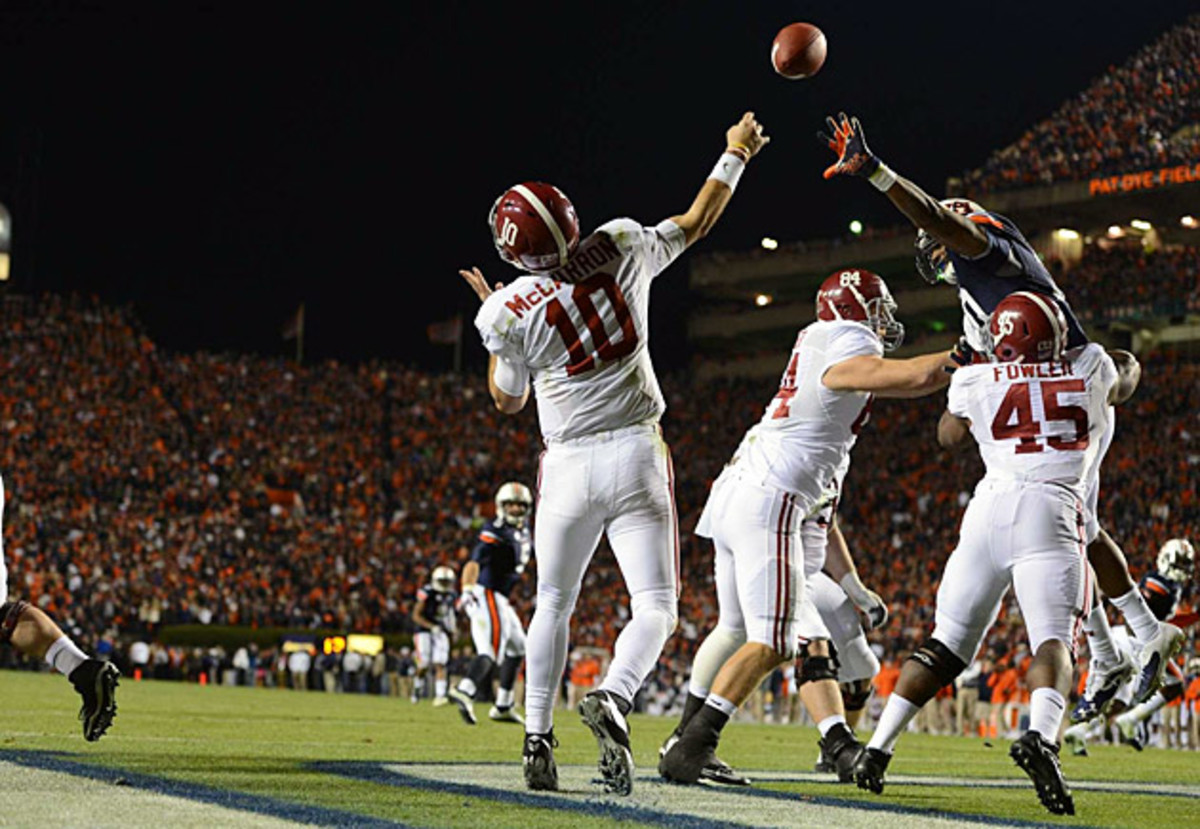
Early fourth quarter, full dark, no moon. McCarron throws to the end zone, a 22-yard rainbow that would give Alabama a 27-21 lead, but it goes through Amari Cooper’s hands. The drive stalls. Foster comes on for a field goal, 28 yards from the right hash. Kick is up. Kick is good. Kick is erased. False start, 77 of the offense, five-yard penalty, repeat fourth down.
“Where was that?” Verne Lundquist asks from the CBS booth.
Replays show that right guard Arie Kouandjio barely flinched. In the bleachers, Foster’s mother gets a text from her brother. “The guy breathed,” it says, or something to that effect, but it doesn’t matter, because Foster has to kick it again. This time he kicks the ground first, raising a small cloud of dust, and the ball spins weirdly to the left. No good. Game still tied at 21.
Around this time, two Auburn fans leave the stadium and head for the intersection of College Street and Magnolia Avenue. They are Alvin Willis, head of downtown maintenance for the city of Auburn; and Catrina Cook, assistant director of environmental services. They leave early because of toilet paper. When Auburn wins, their fellow Auburn fans celebrate by hurling several tons of it in the air. This is littering, of course, but it’s also tradition, a reference to the time Alabama came in ranked No. 2 and Auburn beat the No. 2 out of ‘em, and the city temporarily suspends its rules for football fans as long as they don’t set the toilet paper on fire.
Willis and Cook miss the fourth quarter so they can stand at Toomer’s Corners with a crew of 16 and a knuckleboom truck just in case someone has to clean up the results of an Auburn victory. The fans would paper the old oaks that used to stand above the intersection, but those are gone now. Three years ago, after Auburn won the 2010 Iron Bowl, an Alabama fan poured herbicide on their roots and poisoned them to death.
Auburn punts. Alabama scores on a spectacular 99‑yard touchdown from McCarron to receiver Amari Cooper. Foster’s extra point wavers left but goes through. Tide 28, Tigers 21.
Alabama gets the ball back and drive inside the 15. A field goal would give them a 10-point lead with less than six minutes to go. It would be 30 yards, about the same distance as the kick that was wiped out by the penalty. But Alabama goes for it on fourth-and-one. Auburn gets the stop and the ball with 5:34 to go.
Alabama’s defense forces another punt, but the ensuing drive stalls after a holding penalty. On comes Foster with 2:41 left. The kick is 44 yards. Three steps back, two steps over, nod to the holder and go. Everything feels right. The ball is true coming off Foster’s foot, the trajectory low for better distance. Battles rage along the line of scrimmage. Auburn’s Gabe Wright jumps too early, but he hears a thudding sound to his right. His fellow lineman Nosa Eguae has blindly put up a hand and blocked the field goal that would have clinched the Iron Bowl for Alabama.
*****

The last minute ticks away as Auburn marches into Alabama territory. Fifty seconds. Forty. Nick Marshall takes the snap and rolls left and tucks the ball and lures the defenders and then switches hands at the line of scrimmage and pushes this weird little duck of a throw over their heads to Coates for a 39-yard touchdown. The game is tied at 28.
On the Alabama sideline, Cade Foster sees the backup kicker warming up. No one has told him he’s being replaced.
Tide coach Nick Saban seems content to play for overtime. With seven seconds left from his own 38, McCarron hands off to Yeldon. The defenders, expecting a long pass, drop back in coverage and leave a gaping hole. Yeldon bursts through the line and gains 23 yards before stepping out-of-bounds. Ten million people watching the game on CBS see a graphic that says END OF REGULATION. But officials are checking the replay.
“After review,” referee Matt Austin says, “the runner’s foot touched out of bounds at the 39-yard line with one second on the clock.”
• BECHT: Which potential spoilers could shake up the playoff race?
Saban sends out the field goal team. Dan and Kelly Foster look for Cade. When he was in high school, they took him to the stadium on days off so he could practice his kicking. Dan was the holder. Kelly retrieved the footballs. “We’re proud of you no matter what,” they told him. “We love you no matter what. You don’t have to play football.” But he wants to play, and they love watching him, and now they find him on the sideline, just another spectator, watching someone else take the biggest kick of his career. Saban has put in Adam Griffith, a redshirt freshman with a strong leg, for a 57-yarder to win the game.
“Girl,” Michelle Shepherd says to her sister, “this game is getting heavy.”
Auburn coach Gus Malzahn calls timeout. “Let’s put Chris back there,” an assistant coach says. They assign their punt returner, Davis, to the end zone, in case the kick falls short.
The snap is good. The hold is good. The kick falls from the night sky into the waiting arms of Chris Davis. He tears out of the end zone, looking for a seam, and finds one near the left sideline. One by one, he sprints past the slow Alabama linemen. His teammates on the kick-coverage team are blockers now, and they eagerly take on the challenge. Alabama linebacker Adrian Hubbard is one of the better tacklers on the field, but he’s cut down by two men in navy blue. Davis runs on.
On long returns like this one, the kicker himself serves as tackler of last resort. Foster may be the best-tackling kicker in college football. But he can only watch from the far sideline as his substitute gets leveled by a 284-pound defensive tackle. Davis crosses midfield with a clear path to the end zone. God is good, he thinks as he runs for the winning touchdown.
A disaster. A miracle. The face in the window, the falling star. In Gordo, still awash in condolences, Anthony Pruitt sees his team lose the Iron Bowl on a fourth missed field goal and a 109-yard return with no time on the clock.
“What are the odds,” he says.
*****
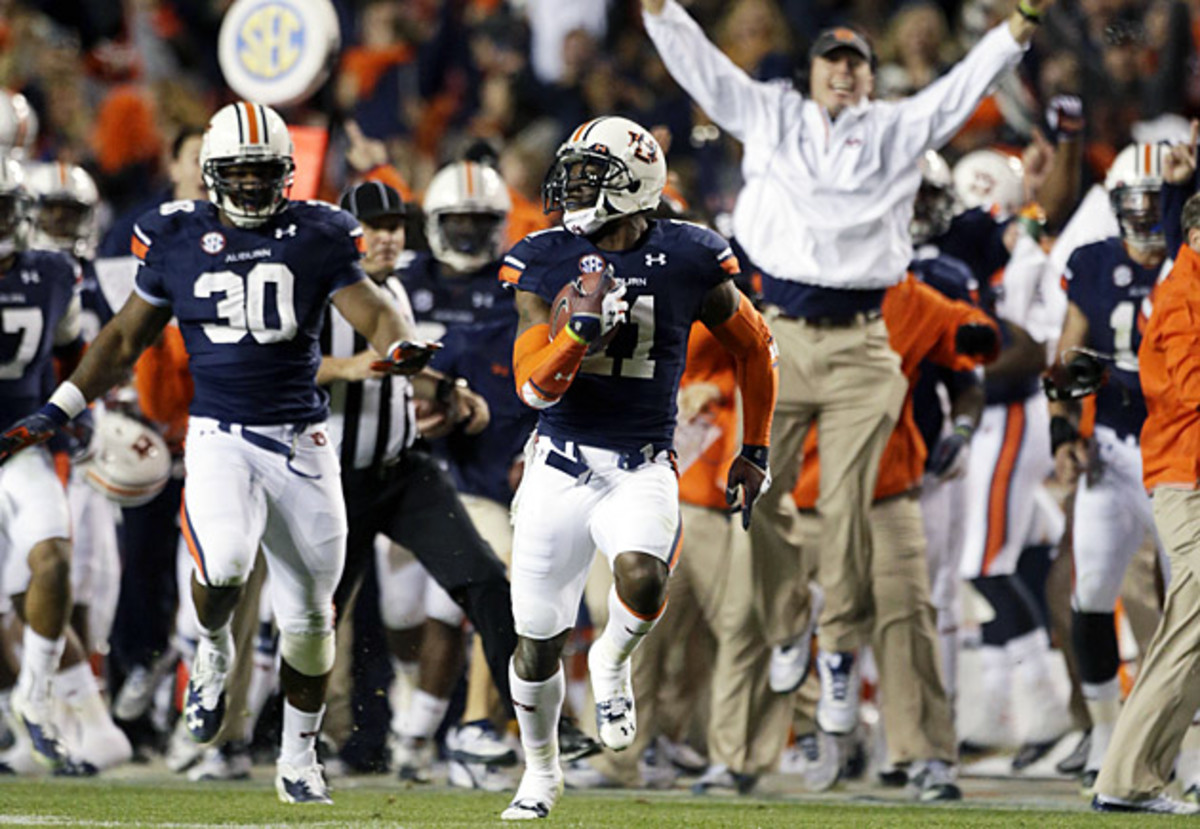
As Davis crosses the goal line, others cross into delirium. His teammate Jonathon Mincy is so overjoyed that he grabs Davis around the middle and throws him to the ground. The Tigers pounce on their hero, nearly crushing him with their combined weight. Davis can’t breathe. Neither can defensive end LaDarius Owens, trapped alongside him at the bottom of the pile. Elsewhere, Auburn linebacker Cassanova McKinzy has made the mistake of jumping into the stands. The jubilant fans pull on his helmet and tear at his clothes. “They were trying to kill me,” he will say later, but he survives, and so does his cousin Chris Davis. The Tigers unpile themselves. Davis and Owens stand up. All the way back to the locker room, Owens is trying to catch his breath.
Someone is first across the wall of thornbushes, a sort of kamikaze Pied Piper, and each follower helps clear the way for the next. Fans pour onto the field like water from a ruptured dam. Someone scatters a loved one’s ashes. Someone looks Gus Malzahn in the eye and snatches the hat off his head. They steal pylons, chunks of turf, thorns from the conquered bushes. Eight or ten guys pick up a costly exercise machine from the Auburn sideline and carry it toward the exit. The crowd is so large and persistent that a 300-pound Auburn lineman named Alex Kozan needs a full hour to wade through it and reach the locker room. Outside, the toilet paper is flying. It hangs from the trees and curls over the wires and collects on the ground like snow. A man in Alabama crimson leaves his friends and disappears into the Auburn throng. He emerges half an hour later, a wild grin on his face.
“I just wanted to see what it was like,” he says.
At the apartment in Hoover, Auburn fans laugh at Alabama fans. “Y’all ain’t gonna be No. 1 no more,” someone says. The Shepherd sisters laugh too, because even though they’re wearing BUILT by BAMA T-shirts they would rather be watching the Miami Heat.
“It doesn’t really matter,” Neketa says.
Another Tide fan overhears them, a woman they don’t know. “Do you not realize Alabama just lost,” she says, “and you’re sitting here laughing?”
Outside in the parking lot, the quarrel escalates. The woman pulls a gun and shoots Michelle Shepherd in the chest. Michelle dies there, at age 36, leaving behind three children, one sister, and an unfinished cake in the kitchen cupboard.
*****
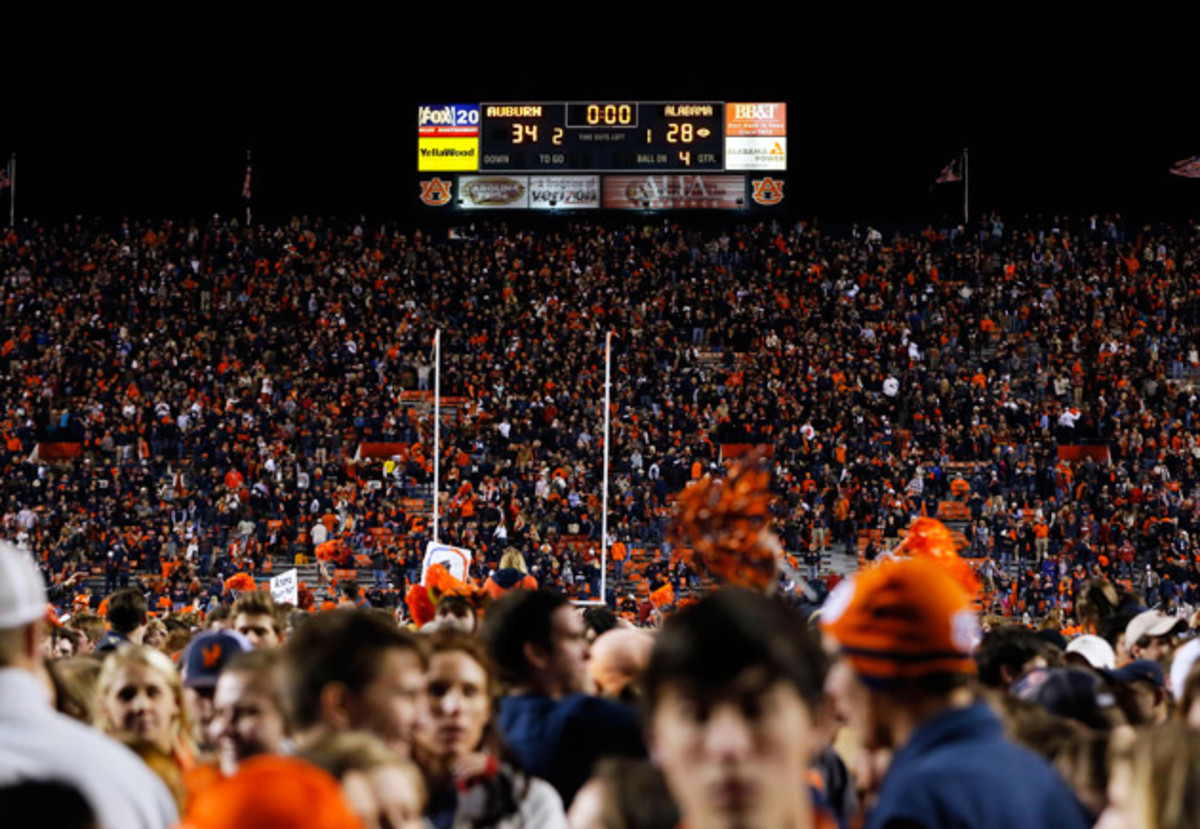
The Auburn fans wear navy blue, and they wave orange pom-poms, and in covering the field they make a sort of impressionist painting, a night sky full of exploding stars. David Housel remains in his seat for a long time, taking in the colors. He’s 67 years old, the former athletic director for Auburn, and in all his life he’s never seen anything more beautiful than that dark blue sky and those orange stars.
You were a child and you wanted those stars, to pull them from the sky, hold them in your fist. You just wanted to see what it was like, and when you couldn’t reach the stars, maybe you settled for the flame of a candle. You were angry when someone pulled your hand away, angrier when no one did, and even after you touched fire for the first time you kept thinking of ways to touch it again.
This is how mobs form: heat, light, desire, the specific emotion less important than its burning intensity. They caught Henry Wells, and a mob gathered on the courthouse lawn. The star fell on Ann Hodges, and a mob gathered in her living room. Chris Davis crossed the goal line, and a mob took the breath from his lungs.
Now Davis escapes in the dark, visits his family at their RV, watches a little football, eats some chips and Ro-Tel dip. And then, instead of going downtown and getting crushed again, he goes back to his dormitory for the night.
On the ride back to Tuscaloosa, Cade Foster pulls out his iPhone and opens Twitter. He sees a sharp increase in followers, a long list of mentions. Someone tells @Foster_43 to kill himself. Another suggests he drink bleach. “I’m coming for you,” writes a third, “you gonna die tonight.” It goes on like that. Outside his apartment he finds a police officer standing guard.
The night is long in Tuscaloosa, almost 14 full hours, with barely a trace of the moon. Foster hears a knock at the door and assumes the worst. He goes to the bedroom for his rifle.
“Cade,” his mother calls from the living room. “It’s your buddies.”
Foster comes back without the gun to see three teammates who are here to make sure he’s all right. He will be, eventually. His mother gives him a hug.
“The sun will come up tomorrow,” she says, and the tide falls in Mobile Bay, and the bars close in Auburn, and the world turns, another mile every four seconds, carrying Alabama toward morning.
